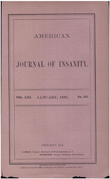Treatment outcome in recurrent major depression: a post hoc comparison of elderly ("young old") and midlife patients
Abstract
OBJECTIVE: The authors compared response rates, the temporal course of response to acute treatment, and relapse rates during continuation treatment of elderly and midlife patients with recurrent major depression. METHOD: They analyzed results from two separate controlled studies of maintenance therapies for recurrent major depression, in which 148 elderly patients (mean age = 67.9 years) and 214 midlife patients (mean age = 38.5 years) were treated in open acute and continuation therapy with a combination of interpersonal psychotherapy and a tricyclic antidepressant (nortriptyline for the elderly, imipramine for the midlife patients). In an intent-to-treat analysis, remission rates during acute treatment and relapse rates during continuation treatment were examined. Random regression analysis of weekly Hamilton depression scale ratings was used to compare the temporal course of response. RESULTS: During acute-phase therapy, 78.4% (N = 116) of the elderly patients and 69.6% (N = 149) of the midlife patients had remissions. The midlife patients had a faster reduction of Hamilton depression ratings. Following stabilization, 15.5% of the elderly patients and 6.7% of the midlife patients relapsed. Ultimately, 66.2% of the late-life patients and 57.0% of the midlife patients recovered fully. CONCLUSIONS: Older patients appear to benefit as much as, but perhaps more slowly then, midlife patients from treatment of major depression. Continuation treatment should be vigorous and closely monitored, given the apparently higher relapse rates among the elderly. These conclusions should be viewed as preliminary because of the post hoc nature of the analysis reported here.
Access content
To read the fulltext, please use one of the options below to sign in or purchase access.- Personal login
- Institutional Login
- Sign in via OpenAthens
- Register for access
-
Please login/register if you wish to pair your device and check access availability.
Not a subscriber?
PsychiatryOnline subscription options offer access to the DSM-5 library, books, journals, CME, and patient resources. This all-in-one virtual library provides psychiatrists and mental health professionals with key resources for diagnosis, treatment, research, and professional development.
Need more help? PsychiatryOnline Customer Service may be reached by emailing [email protected] or by calling 800-368-5777 (in the U.S.) or 703-907-7322 (outside the U.S.).



